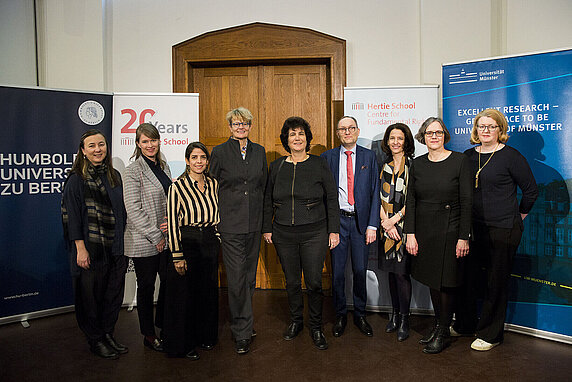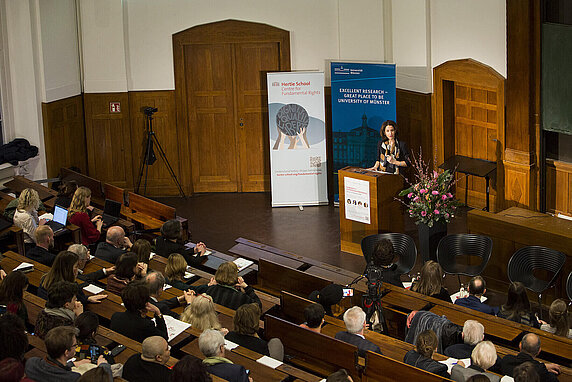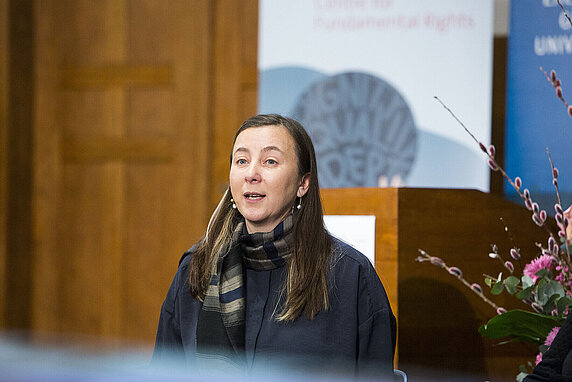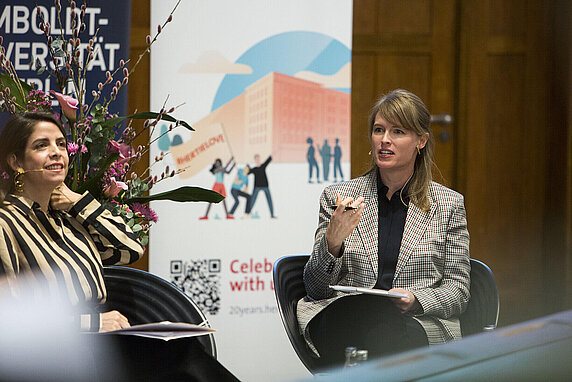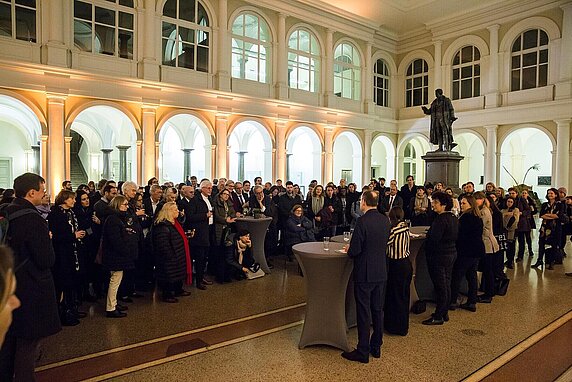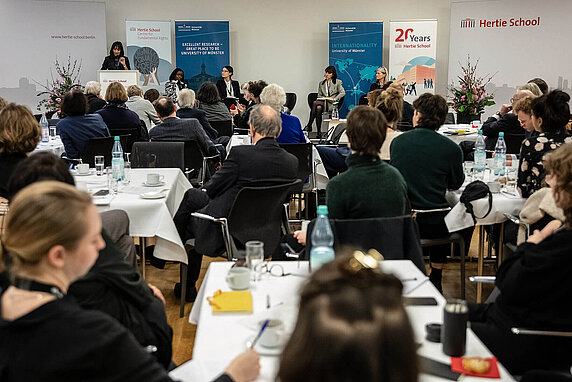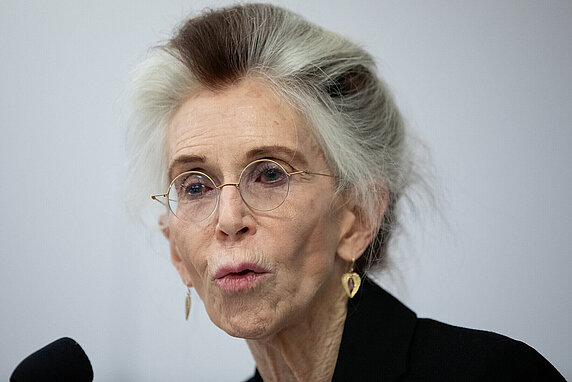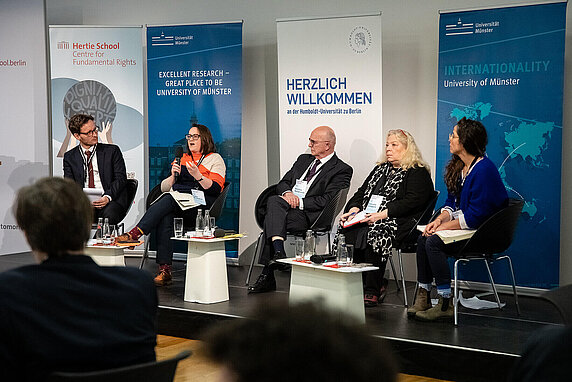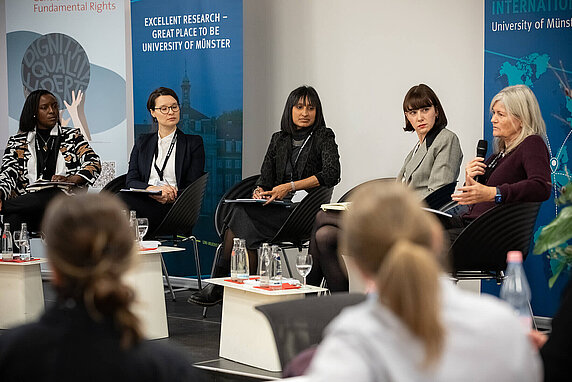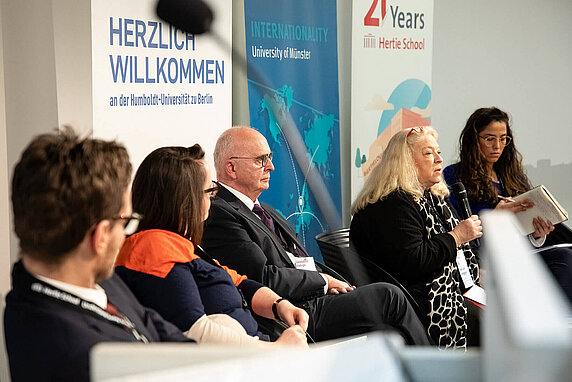Jointly hosted by the Centre for Fundamental Rights and the University of Münster, in cooperation with the Integrative Research Institute Law & Society at Humboldt University Berlin from 8 – 9 February, the two-day conference explored pressing challenges to legal constitutionalism, and the role of courts in facing them.
The conference, convened by Professors Başak Çalı (Hertie School), Nora Markard (University of Münster) and Cathryn Costello (University College Dublin and Hertie School), was organised to pay tribute to the outstanding contributions that Professor Susanne Baer, former Justice on the Federal Constitutional Court of Germany and Professor of Public Law and Gender Studies at Humboldt University of Berlin, has made to the doctrine and scholarship of fundamental rights and to the practice of judging.
The opening event of the conference, held at Humboldt University's Campus Nord on Thursday, 8 February 2024, commenced with a conversation on “Judging in a Constitutional Democracy” with Justice Daphne Barak-Erez, Supreme Court of Israel; Judge Ivana Jelić, European Court of Human Rights (ECtHR); Prof. Andreas L. Paulus, Former Justice of the German Federal Constitutional Court; and Justice Daniela Salazar Marín, Constitutional Court of Ecuador. It was preceded by welcoming words from the presidents of Humboldt University and the Hertie School.
The conversation, chaired by Professors Başak Çalı and Nora Markard, was interrupted at the outset by a group of protesters, who said they wanted to read a statement. This was accepted, and a person read a 10-minute statement, criticising the Israeli state, the Israeli Supreme Court and the organisers of the event. The organisers then offered the protesters to either stay and permit the event to continue, or to leave the auditorium. This was met with persistent interruptions and commotion. Following several unsuccessful efforts to start the conversation on stage, the event was suspended. A joint statement from the co-hosts, Humboldt University Berlin and the Hertie School, has been issued here.
As planned, participants and guests then gathered in Humboldt University’s Thaer Hall. There, the conversation on 'Judging Under Pressure' was resumed in front of an audience of over 100 people. The discussion included reflections and questions about the role of judges under pressure, a call for the protection of democracy, and thoughts on the importance of enabling political debate and dissent.
Daniela Salazar Marín kicked off the discussion by underlining that while some of the challenges facing constitutional courts are universal, others are unique to specific regions or countries. “When we think about what kind of court is worth preserving, it is certainly not a court without courage, without principles, or one that does not uphold the values of democracy” she asserted.
Daphne Barak-Erez then reflected on the vital role of judges in safeguarding freedom of speech, a cornerstone of democracy. In addition, she stressed the need for judges to adapt to the evolving realities of the information age. “We should continue writing our professional opinions, but at the same time also engage in a more effective dialogue with the public. We should think about how to give the public tools to understand our decisions, and thus bring our message to it.”
Ivana Jelić highlighted the role of the ECtHR in protecting democracy through law. She emphasised the importance of preserving a plurality of voices and the centrality of anti-discrimination laws.
Andreas Paulus elaborated further on the role of courts in protecting minorities. “Democracy is not the rule of the majority over the minority. It is about representing all citizens equally. When lawmakers forget minorities, it falls upon the courts to protect them," he stated.
The conference continued the following day with a full-day symposium on “Current Challenges to Constitutional Law” held at the Hertie School, bringing current and former apex court judges together with established and early career scholars of constitutionalism and human rights. The symposium, which was also livestreamed, opened in front of an audience of 80 people with a keynote speech by Catharine A. MacKinnon, Professor of Law at University of Michigan Law School and James Barr Ames Visiting Professor of Law at Harvard Law School. During her address, Professor MacKinnon masterfully reflected on how substantive equality through law can address the three challenges the symposium focused on: "Persistent Inequalities", "Democratic Backsliding" and "The Climate Crisis".
A recording of the full symposium is available here (Keynote, Roundtable 1 -2) and here (Roundtable 3).
The first roundtable focused on persistent inequalities. It featured Shreya Atrey (University of Oxford), Kate O'Regan (University of Oxford, formerly South African Constitutional Court), Sarah Ganty (Ghent University), Cara Röhner (RheinMain University of Applied Sciences) and Victoria Miyandazi (University of St Andrews). The panelists discussed the gap between structures of inequality and the limits of equality and anti-discrimination laws from a comparative perspective, exploring these as threats to democracy and constitutionalism itself.
The second roundtable revisited the topic of democratic backsliding. It was chaired by Mirosław Wyrzykowski (University of Warsaw) and featured Kim Lane Scheppele (Princeton University), Fiona De Londras (University of Birmingham), Mariana Velasco-Rivera (Maynooth University) and David Kosař (Masaryk University). The discussions centred on whether and how constitutional and international courts can act as bulwarks against antidemocratic and authoritarian practices.
The final roundtable interrogated the limits and potentials of courts in addressing the climate crisis. Chaired by Natalia Ángel Cabo (Constitutional Court of Colombia; Universidad de los Andes), and with contributions from Gabriele Britz (University of Gießen, formerly German Constitutional Court), Juan Auz (Tilburg University) and Sam Bookman (Harvard Law School), it focused on comparative lessons that can be learned from judicial interventions in Germany, Colombia and the Inter-American Court of Human Rights.

